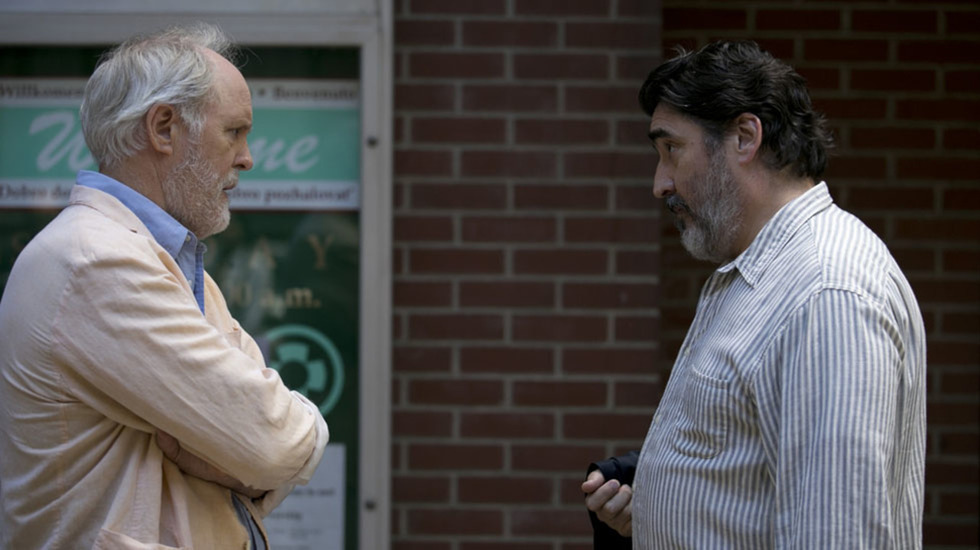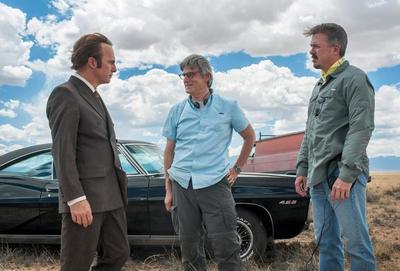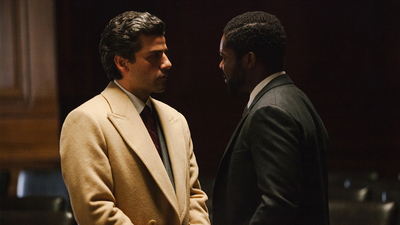
BY ZACHARY WIGON |
Under The Hood: 'Love Is Strange' and the Power of Withholding
Ira Sachs's latest has a strong lesson to teach regarding the power of not showing something.

(Spoiler alert: if you have not seen Ira Sachs's wonderful new film, Love Is Strange, read no further, lest the ending be spoiled for you! And seriously, get yourself to a movie theater stat - this is one of the strongest releases we'll see this year.)
There's an enormous power in the narrative device of understatement, since it creates drama by engaging the audience as a co-storyteller as opposed to doing what most dramatic films do, which is pummeling the audience with What They Are Supposed To Be Feeling. (Okay, perhaps it's not necessarily most dramas that do this, but in the US today, contemporary films tend to err on the side of on-the-nose as opposed to subtle.) I was reminded of the power of understatement this weekend when I saw Ira Sachs's latest film, Love Is Strange, which has rightfully become one of the most well-reviewed films of the year. (Full disclosure: three of the film's producers served as the producer and executive producers of my feature The Heart Machine.)
Storytelling is absolutely a collaborative art form between the artist and the audience.
The film, as you probably know - since you hopefully aren't reading this if you haven't seen it! - concerns the marriage and consequent physical separation imposed upon longtime partners George (Alfred Molina) and Ben (John Lithgow) as they are forced to sell their New York apartment due to George's unjust firing, which comes as a result of the couple's decision to wed. The film is about the couple's separation and the manner in which their lives intersect with those of their friends and relatives over the course of that separation, and the film's narrative climax comes with the death of one of the members of the couple.
Fascinatingly and quite powerfully, Sachs chooses to withhold the representation of this death from us; that is to say, the death scene is not in the film. The decision could perhaps sound counterintuitive if one hasn't seen the film, but again, you, dear reader, have, so I suspect you had a similar reaction to my own: a great degree of pathos was felt! Why is this the case? I think that the withholding of a crucial event from a narrative (even the climax) - if it can be easily understood, is plausible, and is, in retrospect, foreseeable - can be an incredibly powerful way of forcing the audience to join in the creation of the film's narrative.
It's respect for the audience's participation that makes the ending of Love Is Strange so sublime and effective.
Storytelling is absolutely a collaborative art form between the artist and the audience - the only stories that don't allow for the audience's participation are those that deeply insult and underestimate the audience's intelligence. The multiplex is littered with films like these today, and this is no doubt a central reason as to why so many intelligent adults prefer their visual entertainment televised. But when an artist can find a way to make the audience an active part of the viewing experience, creating pathos and meaning and connecting the dots, as it were, on their own without having to be spoon-fed the narrative's drama - this can be an arresting mode by which the audience is given space to enter the film's drama, to imbue the film's atmosphere with emotions that - while appropriate - are of the audience's choosing.
Had the death scene in Love Is Strange have been filmed and placed in the movie, there invariably would have been a certain defined range of emotional possibilities within which the audience would be prompted, by the film, to reside. Without the scene being in the film, the audience is freed from any major dramatic obligations and instead is allowed to process the reality of the death - and the emotional resonance it contains - according to their own whims and tastes, their own way of being in the world and conceptualizing grief and loss. It's this respect for the audience's participation that makes the ending of Love Is Strange so sublime and effective.

